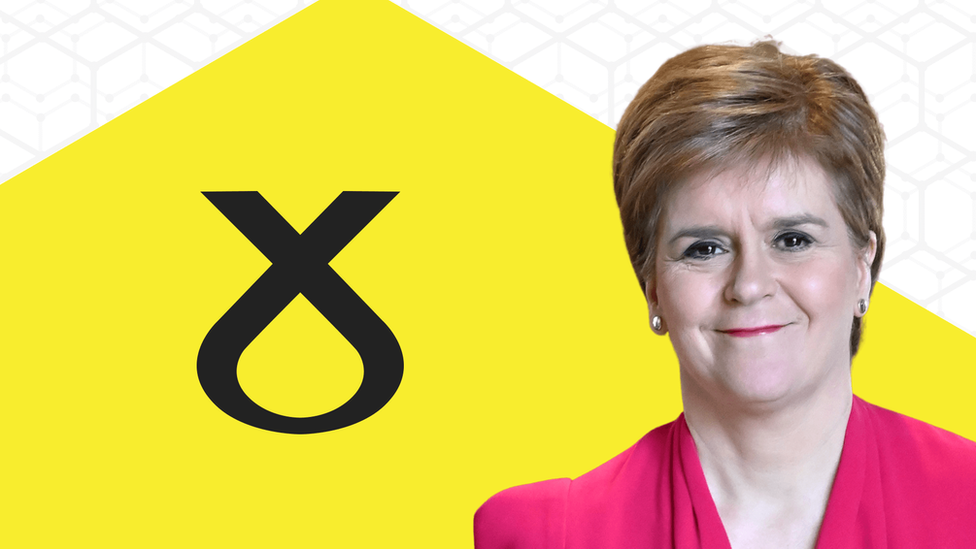Scottish election 2021: A simple guide to the Scottish Conservatives
- Published
The Scottish Conservatives are the second largest party in the Scottish Parliament, with 30 MSPs out of 129 seats.
The party is often referred to as the Scottish Tories.

Scottish Conservative leader Douglas Ross
Who is the leader?
Douglas Ross. The 38-year-old has represented his local area since 2007, when he was first elected to Moray Council. Mr Ross stood for the Conservatives in a series of elections for Westminster and Holyrood, eventually becoming an MSP via the Highlands and Islands regional list in 2016.
He acted as the party's justice spokesman, but his time at Holyrood was short-lived after he won a Westminster seat in the following year's general election, taking the Moray constituency from the SNP's deputy leader Angus Robertson.
Mr Ross has been an ally of Prime Minister Boris Johnson, having supported his leadership campaign in 2019 after initially backing outsider Mark Harper, who was eliminated in the first round. He is also a qualified football referee, and has acted as a linesman in many high profile fixtures in Scotland and beyond.
He won the Scottish Conservative leadership in August 2020, replacing predecessor Jackson Carlaw. Former leader Ruth Davidson stood in for Mr Ross at First Minister's Questions until this year's Scottish Parliament election, when she will take a seat in the House of Lords.
Mr Ross is looking to return to Holyrood as an MSP in this election.
What does the party need to do to win the election?
The Scottish Conservatives need to elect 35 more MSPs to form a government on their own. Realistically, the party will be aiming to increase its number of seats and again finish as the second largest party, and prevent the SNP winning a majority.
Key Policies
End division and rebuild the country from the pandemic
Oppose another referendum on Scottish independence
A school catch-up plan comprising a nationwide tutoring scheme and hiring 3,000 extra teachers
A law guaranteeing the funding the Scottish government would have to pay to local authorities
Where does it stand on independence?
The Scottish Conservatives are strongly opposed to Independence and want the UK to remain united. In February, their leader Douglas Ross accused Nicola Sturgeon of putting her party before the pandemic by planning a "reckless" referendum.
Prime Minister Boris Johnson has so far rejected calls for a new independence referendum by insisting the 2014 vote was a "once in a generation" event and the country should be focused on recovering from the pandemic.
Scottish Conservatives policy in a tweet
Allow X content?
This article contains content provided by X. We ask for your permission before anything is loaded, as they may be using cookies and other technologies. You may want to read X’s cookie policy, external and privacy policy, external before accepting. To view this content choose ‘accept and continue’.
What is the Scottish Conservatives history?
The Conservative Party is the oldest political party in the UK, dating back to the 19th Century.
The Scottish Conservatives full title is the Scottish Conservative and Unionist Party. The modern-day Scottish Conservatives were formed when the Unionist Party in Scotland merged with the Conservatives in 1965.
In the run up to the 2016 Holyrood election, the Scottish Conservatives campaigned against a second independence referendum and to make the Scottish government focus on "issues that matter". The party had their best result in a Scottish election, gaining 16 MSPs and making them the largest opposition party.
What about the other parties?


Do you have a question about the Scottish Parliament election? Use the form below to send us your questions and we could be in touch.
In some cases your question will be published, displaying your name, and location as you provide it, unless you state otherwise. Your contact details will never be published. Please ensure you have read the terms and conditions.
If you are reading this page on the BBC News app, you will need to visit the mobile version of the BBC website to submit your question on this topic.

- Published14 April 2021

- Published14 April 2021

- Published14 April 2021

- Published16 April 2021
